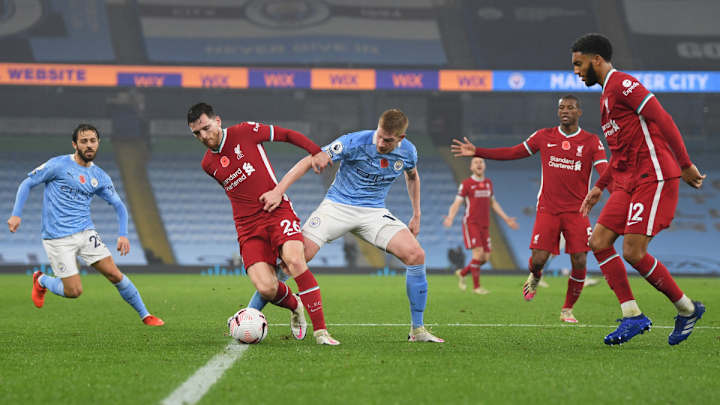Man City, Liverpool Settle for Draw as Fatigue Seems to Set in With Compressed Season

Given it began the day with a five-point lead over its most likely challenger for the title (albeit having played a game more), and given it had lost its previous three league games at the Etihad, a 1–1 draw probably suited Liverpool more than it did Manchester City. But the bigger story may be the way the game dwindled, after a thrill-a-minute first half, to something far more cautious. That was probably in part tactical, but there was also evident tiredness on both sides, something exemplified by Trent Alexander-Arnold suffering a calf injury midway through the second half. In this compressed season, fatigue could be a major factor.
Perhaps this is not the best game to make overly dramatic judgements on. The rain poured down from start to finish and the pitch was, at least by modern standards, heavy. The first half was extraordinarily frenetic. But still, the exhaustion of both sides by the end must be a concern just two months into the season. It’s impossible, of course, to say that Alexander-Arnold would not have suffered his injury had he not been playing two games a week consistently since the season began in September, but soft tissue strains are usually the result of fatigue. Getting this season completed could come at a serious cost.
Liverpool ends the day a point behind Leicester City at the top of the table, while Manchester City remains in the bottom half, although a win in its game in hand would lift it level with Chelsea in fifth. This remains a fascinatingly compact table. And this was, at least in the first half, a fascinating game.
The question in the build-up had been whether Jürgen Klopp would prefer Diogo Jota or Roberto Firmino. As it turned out, to widespread surprise, he picked both, setting up nit in his usual 4-3-3 but a 4-2-4 that became a 4-4-2 out of possession. The result was an extraordinarily open first half in which Liverpool had the initial advantage, finding angles and exposing the back of City’s midfield, which has been an issue for several months now. It was an extraordinary gamble from Klopp, even by his standards, but it clearly unsettled City.
Kyle Walker has been in excellent form this season, but his propensity for making reckless mistakes resurfaced as he caught Sadio Mane with his knee. There was little doubt it was a penalty, but City’s players were incensed no free-kick had been awarded a few seconds earlier for a nudge by Diego Jota on Raheem Sterling. The England forward tried to struggle on but had lost his balance and it was hard to avoid the sense that the whistle would have blown had he gone down. But that’s part of a wider conversation about why so many players are so ready to go down: City had plenty of time to regroup and Walker did foul Mane. Mohamed Salah converted the penalty.
The obvious risk of the Liverpool system was the loss of a body in the middle of midfield. The slight surprise was that City didn’t exploit that more, testament to how well Mane and Jota performed their wide roles. But after 31 minutes, Walker found space wide on the right behind Mane. Georgino Wijnaldum raced across to close him down but by doing so left Kevin De Bruyne in space. Walker fed him and the Belgian fed Gabriel Jesus who turned brilliantly before poking his finish past Alisson.
City, briefly, was dominant and 10 minutes later it was afforded the perfect opportunity to take the lead. By the modern interpretation of the law, Craig Pawson was right to give a penalty as De Bruyne’s cross hit Joe Gomez’s hand. Given how far Gomez was from De Bruyne, it may even have been a penalty under the old interpretation, although the arm was extended as he checked his running motion rather than through any deliberate attempt to make himself bigger. De Bruyne, though, dragged his kick wide of the left-hand post—the first penalty in the Premier League to miss the target entirely since Riyad Mahrez blazed over against Liverpool in October 2018.
The second half was, understandably, a little cagier. Liverpool dropped back into a more consistent 4-4-2 and lost the verticality that had characterized its play in the first half. The loss of Alexander-Arnold didn’t help but equally City should take credit for how it took control of the game. Ruben Dias and Aymeric Laporte are beginning to look like a very accomplished central defensive pairing.
As the pace dropped in the final minutes and both sides apparently settled for a draw, that perhaps was the broader narrative: Liverpool had set City a problem that took it unawares, but by the end it had found a solution.

An accomplished author of multiple books, Jonathan Wilson is one of the world’s preeminent minds on soccer tactics and history.